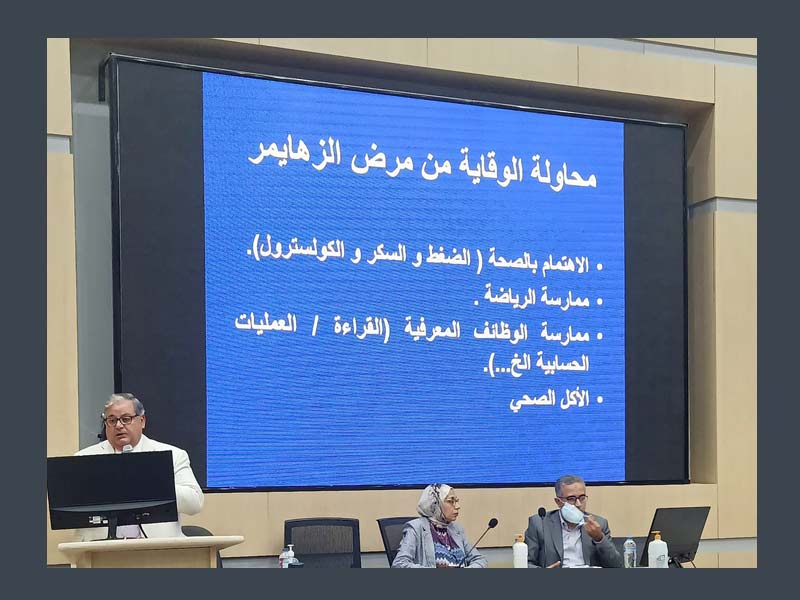The activities of the Awareness Lecture of the Faculty of Medicine of Alzheimer's Disease
Within the framework of the celebration of the Faculty of Medicine and Hospitals at Ain Shams University on the World Alzheimer’s Day, under the auspices of Prof. Dr. Mahmoud El-Matini, President of Ain Shams University, Prof. Dr. Ghada Farouk, Acting Vice President for Community Service and Environmental Development, and Prof. Dr. Osama Mansour, Acting Dean of the Faculty of Medicine and Chairman of the Board of Directors of Hospitals undergraduate, and Prof. Dr. Hala Suwaid, Vice Dean for Community Service and Environmental Development, held a lecture to educate staff working at the Faculty of Medicine and the University and its affiliated Facultys about Alzheimer’s disease, its symptoms and how to prevent it, at the Al-Binhawi auditorium in the Faculty.
Prof. Tarek Ahmed Okasha, professor of psychiatry at the university and president of the Alzheimer’s Association in Egypt, and Prof. Dr. Mohamed Shawky, professor of medicine and health of the elderly and age sciences, gave a lecture, in the presence of a number of university employees, including faculty and staff, and Mrs. Najwa El-Feki as a representative of civil society.
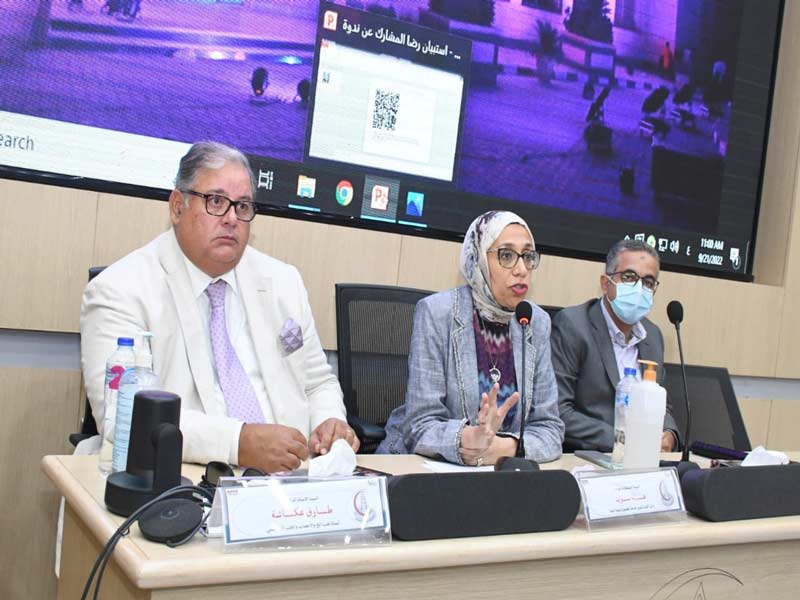 |
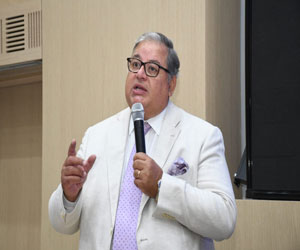 |
|
In her speech during the symposium, Prof. Dr. Hala Suwaid, Vice Dean of the Faculty of Medicine for Community Service and Environmental Development Affairs, said that the university’s celebration of the World Alzheimer’s Day includes several activities, including a lecture, in addition to providing free treatment for the elderly until the end of the month for Alzheimer’s at the University’s Hospital for Elderly Medicine. The university and the Faculty of Medicine will also be lit in purple, which is the distinctive color of Alzheimer's disease, praising the role of the Alzheimer's Association Egypt in raising awareness of the disease.
She added that the Alzheimer's patient needs special care, and with the increase in the number of elderly people in Egypt, it was necessary to pay attention to providing a medical service to the elderly and training the elderly caregiver on how to care for him, noting that the Elderly Hospital at Ain Shams University provided training programs for the elderly caregiver himself.
In the lecture delivered by Prof. Dr. Tarek Ahmed Okasha, Professor of Psychiatry at the university and President of the Alzheimer’s Association in Egypt, under the title “Quality of Life for Alzheimer’s Patients”, he talked about the prevalence of the disease, noting that in 2015 there were 46.8 million cases of dementia (dementia), which is considered Alzheimer's is one of its types and the expected increase is 100% within 20 years, and every year there are about 9.9 million new cases of dementia, which means a new case appears every 3-4 seconds, and there are currently 400,000 cases in Egypt.
He added that the most important thing in dementia is early detection, pointing out that there are no specific treatments for it yet, but medications are being given to slow the deterioration of the patient's condition.
Prof. Dr. Tarek Okasha explained that the scientist who discovered Alzheimer's disease was Alice Alzheimer in 1606, pointing out that Alzheimer's is a disease that causes mental, emotional and behavioral changes and changes in personality, with the presence of some accompanying physical diseases.
He shed light on the Alzheimer's Association in Egypt and its efforts to raise awareness of the disease, and some famous artists, athletes and politicians who have been affected by the disease.
He noted that there are ten symptoms that warn of damansha: memory disturbance for nearby events, inability to perform various aspects of activity, difficulty in language and speech, difficulty making decisions, lack of recognition of time and place, loss of belongings, perpetuation of the movement itself, the emergence of depressive symptoms, The emergence of a change in behavior and personality and isolation from people.
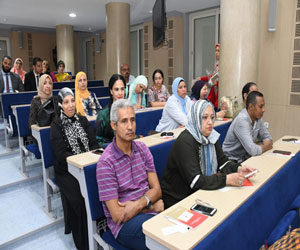 |
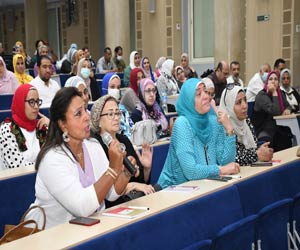 |
|
Dr. Okasha reviewed the stages of the disease development, the first stage in which memory disturbance of nearby events occurs, with the inability to perform various aspects of activity and the emergence of purposeless excessive activity and the persistence of the movement itself, in addition to the lack of recognition of time and place.
As for the second stage, there is difficulty in speaking, writing, and movement, and the emergence of depressive symptoms, and a change in behavior and personality, and the loss of the ability to control urination and defecation.
In the third stage, the patient loses the ability to carry out the basics of life and does not realize anything around him, stressing that it is necessary to take care of the Alzheimer's patient and provide psychological, social and environmental treatment to him in addition to financial support.
Prof. Dr. Mohamed Shawky, Professor of Medicine and Health of the Elderly and Age Sciences, talked about ways to protect and prevent and preserve mental abilities, noting that attention to the quality of food is an important factor, but it is not essential, but mental abilities must be taken care of, such as practicing some cognitive functions such as reading, conducting deep dialogues, and writing notes to strengthen the mind. In addition to exercising, drinking water, getting a good sleep, following up on chronic diseases such as pressure, sugar and cholesterol to maintain the health of the arteries, and dealing with stress, which may be a door to many diseases, adding that among the daily activities that preserve memory is focus in worship such as prayer and reading the Holy Quran.


.svg)

